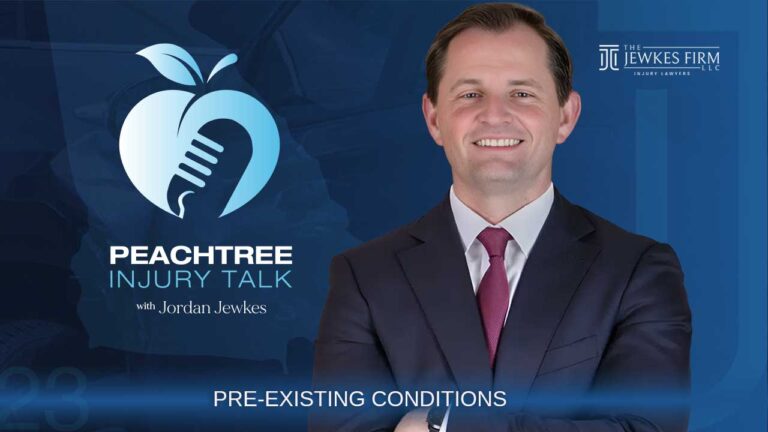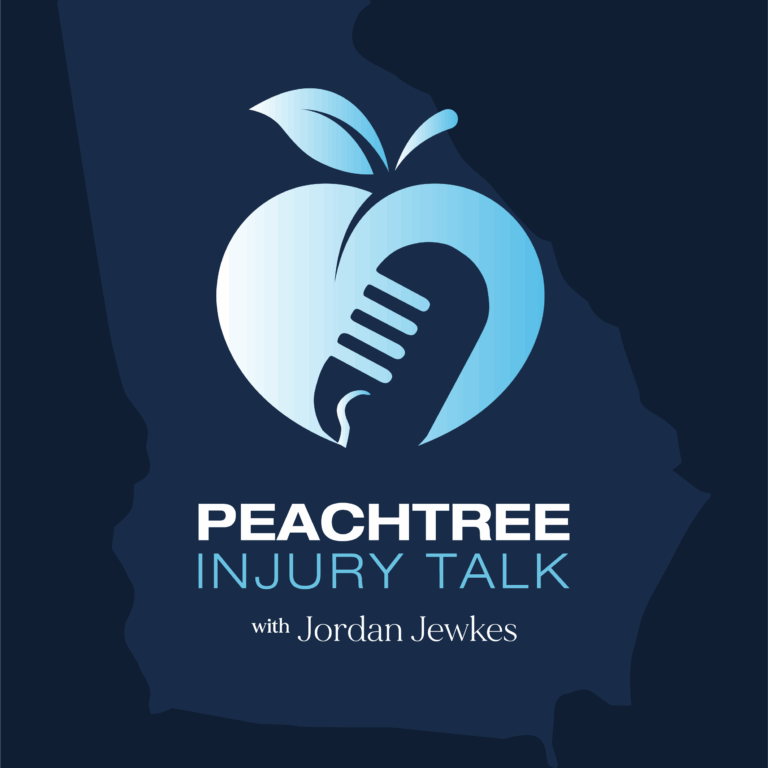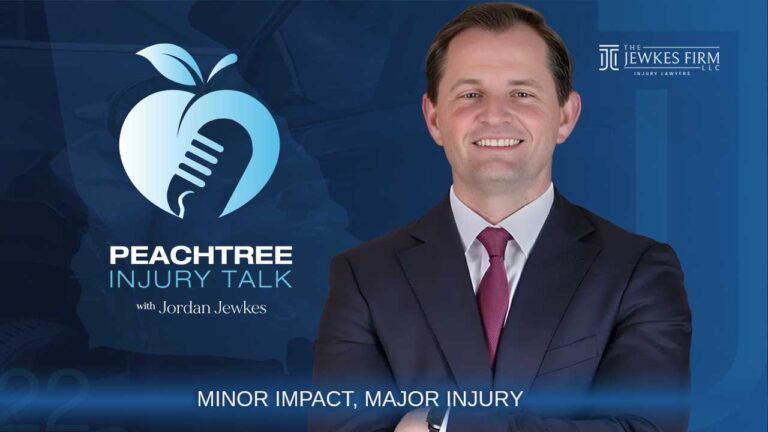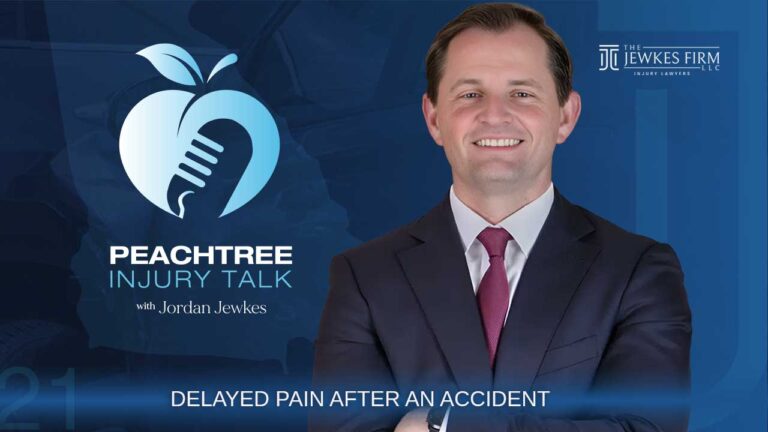
Pre-Existing Conditions — Will They Use Your Medical History Against You?
In this episode of Peachtree Injury Talk, attorney Jordan Jewkes discusses the impact of pre-existing conditions on injury claims. A pre-existing condition is a medical
Home | Podcasts | Peachtree Injury Talk | Slips, Trips, and Premises Liability — What Property Owners Don’t Want You to Know
Peachtree Injury Talk with Jordan Jewkes
In this episode of Peachtree Injury Talk, attorney Jordan Jewkes discusses slip and fall injuries and premises liability, explaining that property owners—whether landlords, businesses, or homeowners—have a legal duty to keep their premises reasonably safe. Jewkes highlights that liability arises when owners knew or should have known about hazardous conditions, such as spills or uneven surfaces, and failed to address or warn about them. He notes the importance of timing in these cases, as owners must have had a reasonable opportunity to fix hazards, and emphasizes the critical role of photographic or video evidence in proving claims. While warning signs like wet floor signs reduce liability, claims are still possible if hazards are concealed or not properly maintained. Jewkes also warns against owners destroying evidence and encourages injured individuals to seek legal advice promptly, assuring free consultations to help victims understand their rights and options for compensation.
| 00:00 | Narrator: Welcome to Peachtree Injury Talk with Attorney Jordan Jewkes. |
| 00:05 | Evan Mack: Welcome to Peachtree Injury Law Talk with attorney Jordan Jewkes. I’m Evan Mack, and today we’ll discuss slip and fall injuries, how property owners try to avoid responsibility, and what you need to know if you get hurt on someone else’s property. Jordan Jewkes is a seasoned trial lawyer and former insurance defense attorney. He now uses his insider knowledge to advocate strongly for injury victims across Georgia. Jordan, welcome back. |
| 00:36 | Jordan Jewkes: Thank you, Evan. Always glad to be here. I appreciate your time. Thanks for having me. |
| 00:42 | Evan Mack: Today’s episode is about slips, trips, and premises liability — what property owners don’t want you to know. This is an interesting topic because many people have misconceptions about it. So Jordan, what exactly is a premises liability case? How does it differ from a regular car accident injury claim? |
| 01:04 | Jordan Jewkes: A premises liability case essentially means you were injured on someone else’s property. That property could be owned, occupied, or managed by someone else—whether a landowner, tenant, or manager. That person has a responsibility to keep the property reasonably safe. If they fail to do so—due to negligence or unsafe conditions—and you get injured as a result of a fall or trip, you may have a claim. |
| 01:47 | Evan Mack: But Jordan, isn’t it hard for property owners to ensure a premises is completely safe? How does that work? |
| 01:55 | Jordan Jewkes: That’s a great point. People often call me saying they slipped at a grocery store or airport. After talking, I explain that the law doesn’t protect you against your own clumsiness. But it does protect you when the owner knew or should have known about a hazard and failed to fix it or adequately warn people. If they don’t take reasonable steps to maintain safety, then they can be held responsible for injuries. |
| 02:38 | Evan Mack: What slip and fall cases do you see most often in Georgia? |
| 02:43 | Jordan Jewkes: One common example is the grocery store slip and fall. Grocery stores have a lot of foot traffic and various sections like frozen foods, produce, and checkout lanes. Because of this, spills from melting ice cream, water, or dropped fruit like banana peels happen frequently. If the grocery store owner doesn’t act reasonably to keep the store safe—meaning they don’t need to be perfect but must meet reasonable safety standards—they can be liable for injuries. |
| 04:35 | Evan Mack: Are grocery stores and restaurants treated differently than private property owners, like farms or homes? |
| 04:49 | Jordan Jewkes: The law itself applies the same to all property owners or occupiers. They all have a non-delegable duty, meaning they cannot ignore or assign away the responsibility to keep the premises reasonably safe. Whether you own a grocery store, a farm where visitors feed animals, or a home where guests may slip on uneven steps or rugs, you have the duty to maintain safe conditions. |
| 06:08 | Evan Mack: What role does timing play in these cases? How important is how quickly a spill is cleaned or a hazard addressed? |
| 06:21 | Jordan Jewkes: Timing is very important. The key legal question is whether the owner had superior knowledge of the hazard compared to the person who fell. Did the owner know or should they have known about the unsafe condition and had a reasonable opportunity to fix it? For example, I had a case where a child spilled a clear soda just seconds before a family member slipped and broke an ankle. The property owner had video evidence showing the spill happened only moments before the fall. Because there wasn’t enough time to clean up or warn people, the owner was not held liable. So, the owner must have enough time between the hazard’s creation and when the injury occurs to reasonably address the danger. |
| 09:39 | Evan Mack: How important is photographic or video evidence in slip and fall cases? |
| 09:49 | Jordan Jewkes: It can make all the difference. In the example I gave, video evidence proved the owner could not have known about the spill in time. In every case, we send a letter to the property owner requesting they preserve any photos, video, audio recordings, incident reports, or other evidence. Often, slip and fall cases are won or lost based on video or photographic evidence that tells the story of what happened. It’s crucial. |
| 11:39 | Evan Mack: What about the classic “wet floor” sign? If there’s a sign, can a person still file a claim? |
| 11:44 | Jordan Jewkes: While having a wet floor sign makes it much harder to prove a claim, it’s not impossible. The law says owners must warn or fix hazards they know or should know about. Once a wet floor sign or orange cone is placed, it serves as a clear warning to anyone walking nearby. If a person sees the sign and still slips, they generally have assumed the risk, and recovery is unlikely. Property owners use these signs to alert people and reduce liability. It’s a good practice for owners to mark hazards clearly. |
| 14:08 | Evan Mack: What are some common myths you hear from people who think they don’t have a case but might? |
| 14:18 | Jordan Jewkes: One common myth is that if they were told they “should have seen” the spill or hazard, they can’t pursue a claim. Sometimes, floors are designed with dark tiles or patterns that actually camouflage spills, making them hard to see. Just because the hazard was visible to the property owner doesn’t mean a visitor could reasonably have seen it. If you slip on a dangerous substance and aren’t sure about your rights, talk to an attorney and get medical treatment. It’s better to be safe. |
| 16:21 | Evan Mack: Have you handled cases where a business or property owner tried to hide or destroy evidence to avoid liability? |
| 16:30 | Jordan Jewkes: Unfortunately, yes. While it’s not every case, some owners do try to delete video or dispose of evidence once they know someone might sue. That’s why we send a legal letter demanding preservation of all evidence. If an owner destroys evidence after receiving such notice, they can face legal penalties or lose some defenses in court. It’s important for property owners to preserve all records and videos related to incidents. |
| 18:19 | Evan Mack: What advice do you have for someone who had a slip and fall injury but is afraid to talk to a lawyer or unsure if they have a case? |
| 18:22 | Jordan Jewkes: Don’t be afraid. We offer free consultations to discuss your situation without any obligation. Even if it’s late or you’re unsure, talking to a lawyer can give you peace of mind. We’ve had clients come to us a year after an injury, worried about pursuing a claim. Sometimes just talking helps, but often there may be something we can do to help you get compensation or closure. |
| 19:13 | Evan Mack: Thanks so much for your time, Jordan. |
| 19:16 | Jordan Jewkes: Thank you, Evan. I appreciate it. |
| 19:22 | Evan Mack: Thanks to everyone for watching Peachtree Injury Law Talk with Jordan Jewkes. To learn more or get help, visit JewkesFirm.com. Don’t forget to like, subscribe, and leave a review if you found this information helpful. Thanks, everyone! |
| 19:40 | Narrator: Thanks for watching. Be sure to hit that like and subscribe button and leave us a review in the comments. |

Peachtree Injury Talk is a podcast by Kevin Rosenquist featuring legal insights and practical advice from Georgia-based attorney Jordan Jewkes. The show focuses on personal injury law, offering listeners expert guidance on navigating insurance claims, understanding legal processes, and protecting their rights after an accident. Each episode dives into real-life case examples, common challenges injured individuals face, and actionable tips for dealing with insurance companies and legal hurdles.
Episode Summary
In this episode of Peachtree Injury Talk, attorney Jordan Jewkes discusses the impact of pre-existing conditions on personal injury claims. Jewkes explains that a pre-existing condition is an injury or medical issue existing before an accident, which can be aggravated by the new incident. Despite insurance companies often using pre-existing conditions to deny or reduce claims, the “eggshell plaintiff” rule holds defendants liable for worsening any prior vulnerabilities. He emphasizes the importance of honesty and full medical disclosure to effectively prove aggravation of prior injuries. Jewkes also notes that a previous injury can sometimes strengthen a claim if the accident caused additional harm. He advises those concerned about their medical history affecting compensation to consult an attorney to protect their rights and ensure fair recovery.
Timestamps
00:00 – Introduction to Peachtree Injury Talk
00:10 – About Jordan Jewkes
00:36 – What is a Pre-Existing Condition?
01:43 – Insurance Companies’ Approach to Pre-Existing Conditions
02:41 – How Insurers Use Medical and Claims History
04:40 – The Eggshell Plaintiff Rule in Georgia
06:49 – Proving the Accident Aggravated a Pre-Existing Condition
08:19 – Importance of Disclosing Medical History to Your Attorney
09:00 – Common Mistakes in Disclosing Pre-Existing Conditions
10:15 – Can Past Injuries Strengthen Your Case?
11:56 – Advice for Clients Concerned About Pre-Existing Conditions
12:45 – Closing Remarks and Call to Action
About the Show
Peachtree Injury Talk is hosted by attorney Jordan Jewkes, who is dedicated to giving injury victims a voice and fighting for their rights against an often unfair system. Each episode provides valuable legal insights and practical advice for those navigating personal injury claims.

Slips, Trips, and Premises Liability — What Property Owners Don’t Want You to Know discuss the responsibilities of property owners when someone sustains an injury on their property. Jordan Jewkes, a seasoned trial lawyer and former insurance defense attorney, explains key legal concepts and common challenges faced in these cases, providing practical insights for injury victims.
Premises liability cases arise when unsafe conditions on someone else’s property injure a person. This can involve owners, tenants, or managers responsible for maintaining reasonable safety standards to prevent hazards. Unlike car accident claims, premises liability centers on the property’s condition and whether the owner knew or should have known about a danger and took appropriate action to fix or warn against it.
Jewkes emphasizes that property owners do not need to make premises perfectly safe but must meet a reasonable standard of care. For example, grocery stores see frequent slip and fall accidents due to spills in busy areas like produce or frozen foods sections. If the store fails to clean spills timely or warn shoppers, they can be held liable. The same legal responsibility applies equally to various property types—including private homes, farms, and commercial establishments—since all owners have a non-delegable duty to maintain safe conditions.
Timing is a crucial factor in slip and fall claims. Liability hinges on whether the owner had superior knowledge of the hazard and a reasonable opportunity to address it before the injury occurred. Jewkes recounts a case where video showed a spill happened seconds before a fall, leaving no chance to clean up or warn. In such instances, property owners are generally not liable.
Jordan also highlights the critical role of photographic or video evidence in these cases. Such evidence can help prove or disprove liability by showing the hazard’s condition and timing. Lawyers routinely send preservation letters to property owners early in an investigation to prevent evidence destruction—a tactic unfortunately sometimes attempted by owners seeking to avoid responsibility. Destroying evidence after notice can bring legal penalties and weaken defenses.
Regarding warning signs like “wet floor” notices, Jewkes explains that these can protect owners by alerting visitors to hazards. If a person sees a clear warning and still slips, they are typically assumed to have accepted the risk, reducing chances for recovery. However, the absence of warning signs or failure to fix known dangers can lead to property owner liability.
Jewkes dispels myths that often discourage people from seeking legal help, such as the belief that a person cannot recover if they “should have seen” a hazard. Sometimes flooring patterns or lighting disguise hazards, making them difficult to notice reasonably. He urges anyone injured in a slip or trip to seek medical treatment promptly and consult an attorney to understand their rights.
Finally, for those hesitant to pursue a claim or unsure about their case, Jewkes encourages reaching out for a free consultation without obligation. Even delayed calls can uncover opportunities for compensation or closure, providing peace of mind to injury victims.
In summary, this episode educates viewers on the fundamentals of premises liability law in Georgia, emphasizing property owners’ duty to maintain safe conditions, the importance of evidence and timing, and the need for victims to seek legal counsel when injured by slip and fall accidents. Jordan Jewkes offers practical advice to help people protect their rights and navigate these complex cases effectively. For more information, reach out to The Jewkes Law Firm at (770) 771-5130.
This show is designed to deliver general information regarding the law. Our guests will not provide tailored legal advice. If you have a personal issue and need legal support, get in touch with us for a free consultation with a Jewkes Firm attorney.
Subscribe to our newsletter for essential updates and expert legal advice.

In this episode of Peachtree Injury Talk, attorney Jordan Jewkes discusses the impact of pre-existing conditions on injury claims. A pre-existing condition is a medical

In this episode of Peachtree Injury Talk, attorney Jordan Jewkes from the Jewkes Firm discusses the reality of injuries resulting from low-speed car accidents. Despite

In this episode of Peachtree Injury Talk, attorney Jordan Jewkes discusses the common issue of delayed pain following car accidents. He explains that symptoms often
The information you obtain at this site is not, nor is it intended to be, legal advice. You should consult an attorney for advice regarding your individual situation. Contacting us does not create an attorney-client relationship.
